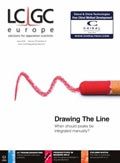The 5th International Network of Environmental Forensics 2015 (INEF 2015) Conference
The 5th International Network of Environmental Forensics (INEF) 2015 conference will be held from 3–6 August 2015 at Victoria College at the University of Toronto, Ontario, Canada.
Photo Credit: nalbank/Getty Images

The 5th International Network of Environmental Forensics (INEF) 2015 conference will be held from 3–6 August 2015 at Victoria College at the University of Toronto, Ontario, Canada. The INEF conference series began in 2008 to provide a forum for scientists, environmental consultants, regulators, and lawyers to share information regarding the use of environmental forensics.
The theme of this year’s conference is “Emerging Trends and New Technologies”. A combination of plenary presentations, short courses, and oral and poster presentation technical sessions will be hosted alongside a lively and varied social programme to encourage networking. There will also be exhibitor stands showcasing the latest instrument and software products available to help solve complex environmental forensics problems.
The short courses will be held on 3 August, focusing on specific areas of environmental forensics and will be given by internationally recognized experts in their respective fields including: statistical fingerprinting as a line of evidence in a forensic evaluation by Mike Bock, application of environmental forensic techniques to track oil spills and “fake” oils by Ioana Petrisor, and applications of GC×GC by Jack Cochran and Frank Dorman.
The programme will also have a number of plenary lectures including “Experts in Environmental Litigation” by Marc McAgree, Law Society of Upper Canada Certified Specialist in Environmental Law, “Where Does All the Oil Go?” by Stephen Mudge, Exponent, and “The Use of Nuclear Magnetic Resonance for Determining Molecular Structure” by Andre Simpson, University of Toronto.
The full scientific programme is listed on the conference website and includes over 100 presentations in a wide variety of topics listed in the following sessions: multidimensional chromatography; microbial source tracking; passive sampling; wastewater; human exposure; monitoring freshwater environments; petroleum hydrocarbons; legal case studies; emerging contaminants of concern 1; emerging contaminants of concern 2; atmospheric source tracking; inorganic forensics; persistent organic pollutants; statistics; advances in analytical assessment; and compound specific isotope analysis.
As well as the series of high-quality lectures there will also be breakout periods with poster presentation sessions and exhibitor booths for delegates to browse with complimentary refreshments provided. There will also be talks from students currently studying environmental forensics. To boost student participation INEF are offering several travel grants to prospective students to help them attend the conference. Students are also encouraged to enter the student competition for the best presentation when submitting their abstracts. The top three students will all receive a generous monitory prize.
To supplement the scientific programme and refuel those tired minds, a reception is planned on the Tuesday and will be held in Dinosaur Hall at the Royal Ontario Museum (a short 2 minute walk from Victoria College). Delegates will have the opportunity to browse special exhibits in the museum collection.
The conference will be held in the prestigious Victoria College at the University of Toronto, which is located in the heart of Toronto with excellent local transport facilities. Conference delegates may wish to extend their stay in Toronto to experience the Panam and Parapanam games that are happening either side of the conference. There is also plenty to see and do in and around Toronto, with a large choice of shopping opportunities, plus vibrant cafes, bars, and restaurants to enjoy. Delegates with a head for heights can visit and abseil off the famous CN Tower. Those looking for a more peaceful time can visit the local Islands, or take a couple of hours drive to explore Algonquin Park by foot or canoe or experience the impressive Niagara Falls.
E-mail: inef2015@gmail.com • Website: www.inef2015.com

LCGC Blog: Forensics Laboratories Underassess Uncertainty in Blood Alcohol Determinations
August 8th 2023The level of uncertainty provided by most forensic laboratories for reported blood alcohol results has been woefully underassessed. Not only is this bad science, but someone’s civil liberties may be at stake.





